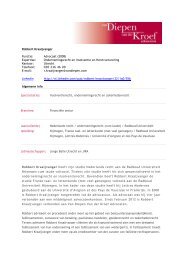© Van Diepen Van der Kroef Advocaten
© Van Diepen Van der Kroef Advocaten
© Van Diepen Van der Kroef Advocaten
- No tags were found...
Create successful ePaper yourself
Turn your PDF publications into a flip-book with our unique Google optimized e-Paper software.
is in that connection incorrect. The present case concerns after all the immunity of aninternational organisation and violation of the norms arising un<strong>der</strong> the prohibition ongenocide (beside numerous other norms for the protection of human rights).173. The District Court has erroneously not drawn a distinction between the position of a stateand that of an international organisation. In addition, the District Court erroneously drawsno distinction between the different forms of ius cogens. The District Court should have heldthat given the fact that the immunity of the United Nations has the purpose of preventingviolations of human rights, the relation between the prohibition on genocide as ius cogensand immunity is entirely different than in the Al-Adsani Case. In that case it was notgenocide that was at issue but the torture of an individual.174. There is no higher norm in international law than the prohibition on genocide. Itsenforcement is an important reason for the existence of international law and the mostimportant international organisation, the UN. That entails that where genocide has not beenprevented no immunity attaches to the international organisation. No greater recriminationcan be made indeed of an international organisation, except the actual commission ofgenocide.That is irreconcilable with the functional character of the immunity of the UN. The DistrictCourt should have concluded that there was a violation of ius cogens and the interests of theAssociation et al. weighed more heavily than the interest of the UN in immunity. Thedecision that the immunity of the United Nations is absolute would mean that the UnitedNations had an absolute power and was not subject to the rule of law, the principle that nooneis above the law and that power is limited and regulated by the law. The DistrictCourt’s judgment rejects that principle. A limitless immunity of the United Nations isunacceptable and un<strong>der</strong>mines the credibility of the United Nations as the important fighterfor human rights.175. The Association et al. is with the above of the view that in these proceedings the Secretary-General of the United Nations had the obligation to waive any possible right to immunity.Indeed, a similar rule is contained in the Convention in various Articles dealing with theimmunity of Member States, officials and experts (see Articles 14, 20 and 23), to the effectthat a review should be conducted to ascertain whether the course of the law is impeded by<strong>©</strong> <strong>Van</strong> <strong>Diepen</strong> <strong>Van</strong> <strong>der</strong> <strong>Kroef</strong> <strong>Advocaten</strong> page 74 of 99
















